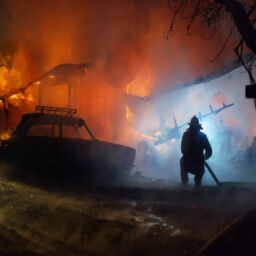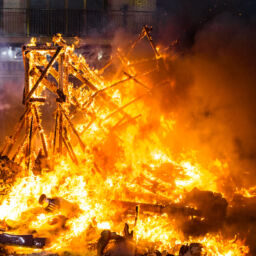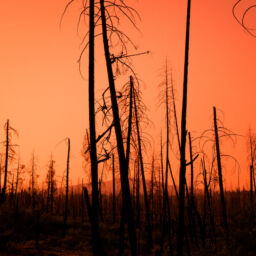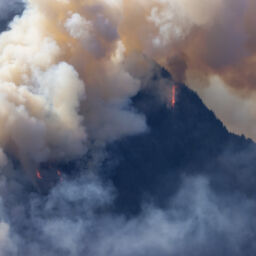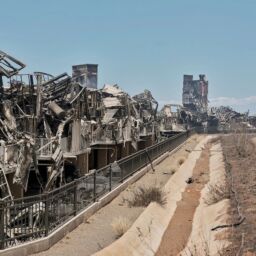It is not enough for Maui native Ashlyn Hi’ilei Ani to make sure that her family and others affected by the deadly wildfires have enough food to eat and a decent place to sleep. Her biggest worry is possibly something she can’t control as the national spotlight slowly fades.
[…]
Tambara Garrick, who has been volunteering 14-plus hours a day in Lahaina and surrounding areas since the fires, shares similar sentiments. Garrick said she’s “beyond exhaustion,” hoping that Maui residents don’t become “out of sight, out of mind” when it comes to getting assistance from all corners.
“Honestly, I’m so tired, but I can’t give up,” said Garrick, a marketing officer for Maui Gold Pineapple whose downtown Lahaina offices were gutted by the fires. “We’re just getting started.”
Across Maui, many residents are worried about being abandoned this week as the island marks one month since the deadliest wildfires in the United States in more than a century. The fires killed at least 115 people, destroyed more than 2,200 structures and caused an estimated tens of billions of dollars in damage. An investigation is underway to determine what initially sparked the wildfires.
Maui County filed a lawsuit against utility Hawaiian Electric Company alleging the company’s failure to shut off power, despite weather service warnings, contributed to the catastrophe. The tragedy’s aftermath is further compounded as authorities in Maui are near completion of the search and recovery phase.
“I think the fear right now is when all of this attention goes away, the big question becomes, ‘What happens next?'” said Hawaii state Sen. Angus McKelvey whose district includes West Maui and Lahaina. “Will all of those commitments and public promises be kept?”
‘We need cash in hands. Now’
As donations ranging from clothes to food continue to arrive in Maui, Sne Patel, who manages vacation rentals around the town of Lahaina, which suffered the most fire damage, said residents want a more tangible item. Patel leads the Lahaina Town Action Committee, an advocacy group of 110 local businesses, many of which saw their properties gutted.
“It’s money that our residents need,” said Patel. “We’re so grateful that there’s a lot of stuff sent early on, but we don’t need that as much. We need more financial, fiscal support.”
Ani said Americans must be generous.
“We need cash in hands. Now,” said Ani, who expressed hope people would give to verified nonprofits including Maui Rapid Response, ‘Aina Momona and the Hawaii Community Foundation.
“Because the truth is, there’s still a lot of uncertainty and a lot of people want to be in a position to lift some of their financial burdens as best as they can,” Ani continued. “For those who want to help, send gift cards. Send money, and let the people decide what they need to empower themselves financially.”
Patel said some people would like to have money in case funding runs out to pay for their temporary housing or to keep up with their prescriptions. Some residents would like to get new clothes or maybe must-have essentials like a new phone or laptop that was lost while they fled from the flames.
And some residents would simply like to buy a new bike to be able to get around town. “To have some sense of normalcy, and not be seen as an afterthought,” Patel said.
Patel said that 85% of the area’s economy is based on tourism, citing the Hawaii Tourism Authority’s recent estimates that West Maui is losing more than $1 million a day and statewide close to $9 million daily. Patel said more than 10,000 jobs were lost in West Maui alone, maybe more, ranging from in the hotel industry, to restaurant workers and caretakers.
Ani said most of her family members work in Maui’s hospitality industry. Ani said she is part of two large families that saw about 56 members lose roughly 11 homes in Lahaina as “many multigenerational relatives” live together as Hawaii is widely considered among the costliest states to live in the U.S.
Those family members are now staying with other relatives in central Maui, Ani said, who created a GoFundMe page to further help her loved ones. She recalls when her cousin, Connor La‘akea Cabanilla Mowat, went back to see the “charred remains of his plantation-style home” in Lahaiana two days after the fire.
She said Mowat, who just married his wife in December and has a 2-month-old son, saw among the ruins a safe that belonged to his mother-in-law. Ani said Mowat told her that he used an ax to break the safe open that had an envelope full of cash the family had been saving, “but the minute he went to pick it up, the money disintegrated, right in his hands.”
“It was so heartbreaking to hear that,” Ani said, on the verge of tears.
Similar hardship stories are scattered throughout, said Kevin Watkins, a Kihei resident who is fundraising to put clean water stations at emergency shelters in West Maui to help residents avoid possibly contaminated water and reduce single bottle water use.
“We’re U.S. citizens, we need more than just a one-time $700 payment from FEMA,” Watkins said. “We deserve more.”
[…]
Making sure the Maui community has a major say
Watkins, who owns Maui Sustainable Solutions, wonders what’s available for residents who are worried about being uprooted.
“What the process is going to look like? What are the options for landowners who lost their homes,” Watkins said. “Will they get to live in trailers, tiny homes or container homes they can put on their properties until they can rebuild again?”
McKelvey said he intends to push for Hawaii Gov. Josh Green’s emergency proclamation, which states that developers must not impede on residents who lost their homes, especially in Lahaina, the historic and former capital of Hawaii, to remain intact.
“We have to make sure that the community has a major say on rebuilding and show the kind of vigilance to get certain entities to back off and let them know that certain properties in Lahaina are not for sale,” McKelvey said.
[…]
Full Story: USAToday September 3, 2023







